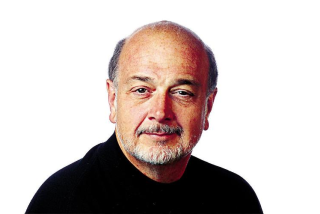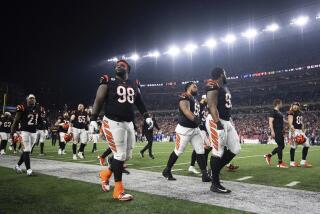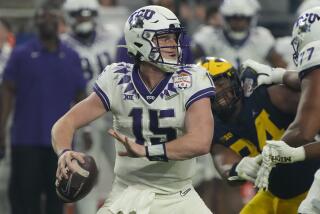Colts Have the ‘Greatest Role Model’ in Dungy
- Share via
Nearly three weeks ago, after the Colts beat the Jaguars and he’d low-keyed his way through another postgame interview, a few writers cornered Tony Dungy in the visiting locker room.
Indianapolis was still unbeaten and Dungy was still answering every question about how far he was willing to look ahead the same way: One week at a time.
Everyone was already tired of the cat-and-mouse game by then, except Dungy. He never seemed to run out of patience.
“How do you stay so calm?” someone finally blurted out.
“My parents,” Dungy began. “Both of them were schoolteachers.”
The rest of the answer, including his transition from fun-loving, sometimes hot-headed kid to grown “Christian man,” was light on details and over in a matter of minutes. For all the faith he instills in others, Dungy knows not to take himself too seriously. So at the end, he grinned mischievously and added, “My high school buddies would be surprised you asked that.”
All that patience, all those lessons learned and the self-deprecating humor are about to be tested like never before. Dungy’s 18-year-old son, James, was found dead early Thursday in his Tampa-area apartment, an apparent suicide. His family is never going to be the same.
“It’s hard to fathom what this means unless you are a parent,” Colts President Bill Polian said later that morning, standing outside the team’s practice facility in Indianapolis, framed by a mournful gray sky.
“And if you are a parent, there aren’t any words to express the kind of pain that I’m sure they’re feeling.”
What Polian said next was much more familiar and easier to grasp.
“Tony made it clear to both myself and to Jim [Irsay, the Colts owner] that he wished for the organization and the team to carry on. And we will,” he said. “We have the greatest role model there is in Tony Dungy.”
Though recognition was slow in coming, Dungy became one of the best coaches of his era by making sure his players never lost sight of what really mattered. He was in everything for the long haul, whether it was perfecting a defensive scheme, volunteering in the community or advancing the cause of African-Americans.
Winning, to him, was always the byproduct of doing things the right way instead of the other way around.
It’s why Dungy wouldn’t make wholesale changes when the sorry Tampa Bay team he was handed as a consolation prize -- both Jimmy Johnson and Steve Spurrier said “no” before Dungy was even interviewed for the job -- began his rookie season 0-5. Shortcuts never interested him, but sacrifice always did.
Dungy was a college quarterback who turned himself into a backup safety as a pro because he reasoned that hanging on by his fingernails was better than not hanging around at all. The more the Bucs learned about their leader, the easier he became to follow. In Dungy’s second season, the Bucs made the playoffs for the first time in 15 years and a perennial championship contender not long after that. In 2001, a year after the Glazer family unceremoniously kicked Dungy to the curb and replaced him with Jon Gruden, the franchise won its first Super Bowl.
“Tony was like our Moses,” Bucs linebacker Derrick Brooks recalled recently on ESPN.com. “He led us out of the darkness and right up to the promised land. “
Unlike Moses, though, Dungy went back to work soon enough. Nothing about him was different on the sideline in Indianapolis, save the color of his outfit. Dungy was still quick to smile, slow to rouse and maddeningly difficult to anger. He was still perfecting his schemes, still volunteering, still speaking out thoughtfully about issues of race and society without ever once shirking his responsibility to any and all of those causes, football least of all.
In short, Dungy was teaching once again, a job to which he’d practically been born. Once the Colts connected his example to that lesson, they understood that disappointing Dungy meant disappointing themselves. They’ve been almost impossible to beat ever since.
Nobody knows when Dungy will be back at work, least of all the coach himself. He has to attend to something more difficult, more important and more sorrowful than anything life has thrown at him before.
All those people that Dungy touched will hold him and his family in their thoughts and prayers. And most of them, his players most of all, will carry on in his absence exactly as Dungy would have wanted. It must feel like precious little consolation at the moment, but the lesson he embodied has already been learned by those of us lucky enough to be tutored:
Leadership isn’t just about what you accomplish, but how you accomplish it.
More to Read
Go beyond the scoreboard
Get the latest on L.A.'s teams in the daily Sports Report newsletter.
You may occasionally receive promotional content from the Los Angeles Times.










